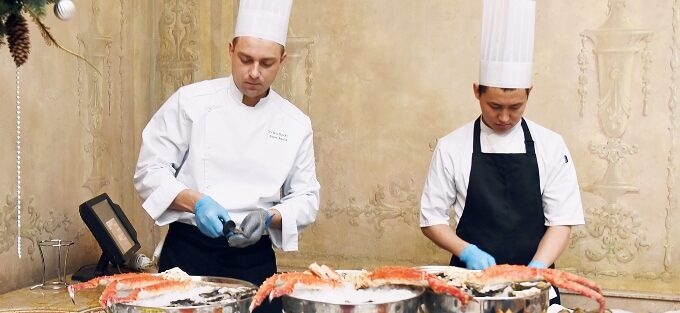Introduction
Culinary Skills That Launch Careers
Are you passionate about food and considering a professional path in the culinary world? A culinary diploma course could be your perfect starting point. It transforms your interest into practical expertise through structured training, hands-on kitchen experience, and industry-standard knowledge.
In this guide, you’ll get an in-depth look at what a 6-month diploma in culinary offers. From kitchen modules and essential skills to specialization options and career pathways, we’ll cover everything you need to make an informed decision about enrolling in a diploma in culinary.
Why Choose a 6 Months Diploma in Culinary?
Professional Training, Fast Results
A 6 months diploma in culinary gives you a solid professional foundation quickly. Unlike longer degree programs, this short course allows you to enter the workforce sooner while gaining all the essential culinary skills.
Ideal for Career Changers and Beginners
Whether you’re shifting careers or starting fresh, this culinary diploma course doesn’t require previous kitchen experience. You’ll learn everything from scratch, starting with the fundamentals.
A Structured Approach to Cooking Mastery
Even with its brief duration, the program delivers a comprehensive curriculum. It includes global cuisines, baking, nutrition, hygiene, and soft skills, which are everything you need to thrive in a modern kitchen.
What’s Included in a Culinary Diploma Course?
1. Introduction to Culinary Basics
Your journey starts with the foundations of kitchen safety, knife skills, heat control, ingredient knowledge, and basic cooking methods like sautéing, roasting, and steaming.
2. Food Safety & Sanitation
You’ll understand the science of clean kitchens, food handling, storage, hygiene standards, cross-contamination risks, and HACCP guidelines. This is critical for any chef aiming to run a compliant kitchen.
3. Baking & Confectionery Fundamentals
Even if you don’t specialize in baking, you’ll gain exposure to the basics of bread, cakes, tarts, pastries, and desserts, adding valuable skills to your profile.
4. Global Cuisine Exploration
A highlight of every culinary diploma course, this module introduces you to diverse cooking techniques and dishes from Italian, French, Asian, Mediterranean, and Middle Eastern cuisines.
5. Culinary Nutrition
You’ll learn about balanced meals, food allergies, special diets, and nutritional values. This helps you meet modern customer demands for healthier dining options.
6. Menu Planning & Food Costing
Learn how to plan dishes, set portion sizes, calculate costs, and optimize your menu for flavor and profitability.
7. Kitchen Equipment & Tools
You’ll become comfortable using commercial kitchen appliances, from ovens and grills to mixers and vacuum sealers. This hands-on familiarity boosts your job readiness.
8. Live Kitchen Practice
Every good 6 months diploma in culinary includes live kitchen exposure. You’ll participate in daily prep, cooking stations, and timed assessments that simulate restaurant pressure.
Key Skills You’ll Develop
Knife Mastery
Precision cutting is the first skill you’ll polish. Learn techniques for dicing, julienning, filleting, and carving safely and efficiently.
Sauce & Stock Making
Master mother sauces, emulsions, and reductions. These are fundamental to flavor enhancement in both modern and classic cuisine.
Recipe Interpretation & Scaling
Understand how to read, follow, and adapt recipes for different volumes, whether cooking for two or two hundred.
Plating & Garnishing
Presentation is just as important as taste. You’ll learn how to plate dishes using color, texture, and balance to enhance visual appeal.
Speed & Time Management
The pressure of real kitchens demands you multitask while maintaining quality. This course trains you to stay organized under stress.
Hygiene & Storage Protocols
Your training will also emphasize food safety principles, correct storage temperatures, FIFO (First In, First Out) inventory rotation, and cleanliness.
Teamwork & Communication
Professional kitchens are collaborative spaces. The diploma in culinary prepares you to communicate clearly with chefs, servers, and kitchen staff.
Optional Specializations You Might Explore
Baking & Pastry
Focus deeper on cake decoration, bread making, laminated dough, and sugar artistry.
Vegetarian & Vegan Cooking
Meet the growing demand for plant-based menus with modules on meat alternatives, dairy-free baking, and nutrient-rich dishes.
Regional or Cultural Cuisine
Choose to master specific cuisine types like Indian regional dishes, Japanese sushi, Italian pasta, or Arabic grills.
Structure of the 6 Months Diploma in Culinary
Month 1: Foundations
- Introduction to culinary principles
- Hygiene and food safety
- Basic knife skills and cooking methods
Month 2: Kitchen Essentials
- Stocks, soups, and sauces
- Vegetables, grains, legumes
- Equipment handling and mise en place
Month 3: International Cuisine
- Regional cooking styles
- Recipe adaptation and menu creation
- Mid-term practical assessments
Month 4: Baking Basics
- Cakes, cookies, bread, and pastries
- Introduction to chocolate and sugar work
- Plating techniques
Month 5: Nutrition & Cost Control
- Balanced meal planning
- Special diets and food allergies
- Pricing, portion control, and menu costing
Month 6: Final Projects & Live Kitchen
- Internships (if offered)
- Final exams and capstone cooking projects
- Feedback and career guidance
Career Options After a Culinary Diploma Course
1. Commis Chef or Line Cook
Start in restaurant kitchens, working under experienced chefs to further hone your skills.
2. Assistant Baker or Pastry Chef
Use your baking training in hotels, bakeries, or pastry boutiques where quality and presentation are key.
3. Cloud Kitchen or Food Truck Entrepreneur
Leverage your culinary diploma to create a niche food business—home delivery, pop-up kitchens, or mobile cuisine.
4. Personal Chef or Catering Assistant
Offer your services to individuals, corporate clients, or event planners for customized meal prep and catering.
5. Food Blogger or Content Creator
If you have a creative flair, combine your culinary knowledge with storytelling, recipe writing, and food photography.
6. Kitchen Manager or Supervisor (With Experience)
With a few years of experience, you could step into leadership roles overseeing kitchen operations and inventory.
How to Pick the Right Culinary Diploma Program
Check the Curriculum
Ensure the course includes all essential culinary topics, live kitchen practice, and modern food trends.
Review Instructor Profiles
Look for chefs with real industry experience, as they bring hands-on knowledge and insider tips.
Tour the Kitchen Facilities
A good program should offer commercial-grade kitchens with the tools and layout you’ll find in restaurants.
Confirm Accreditation
Ensure the institute or course is certified or affiliated with recognized culinary or hospitality bodies.
Ask About Placement Opportunities
Many top programs have partnerships with hotels, restaurants, and catering firms that provide direct job leads.
Who Should Take a Culinary Diploma Course?
Beginners Seeking Structured Learning
No prior experience is required. If you love cooking, this course gives you a professional framework.
Food Entrepreneurs
Planning to launch a food business? A 6 months diploma in culinary offers you both culinary and managerial skills.
Working Professionals Seeking a Career Shift
If you’re transitioning from another industry, this course gives you the skills to switch to the food sector confidently.
Frequently Asked Questions
Is a culinary diploma better than a full degree?
It depends on your goals. A culinary diploma course is faster and focused on practical skills, which is ideal for quick job placement. Degrees offer deeper academic theory but take longer.
Do I need to buy tools or uniforms?
Most programs require you to invest in a basic knife set, chef’s uniform, and kitchen shoes. Some may include this in the fee.
Are there online culinary diploma options?
Some theoretical parts can be online, but real cooking requires in-person practice. Choose blended or full offline formats for best results.
Can I specialize after my diploma?
Yes, many institutes offer advanced short courses in pastry, regional cuisines, or health-focused cooking after your base diploma.
Conclusion: Your Culinary Journey Starts Here
A culinary diploma course equips you with everything you need to start your journey in the world of food. In just half a year, you’ll learn essential cooking techniques, food safety, baking, international cuisine, and real kitchen operations. A 6 months diploma in culinary offers hands-on learning, real-time pressure simulation, and the confidence to work in professional kitchens or launch your venture.
If you’re ready to turn your love for food into a fulfilling career, this diploma in culinary is your launchpad.



